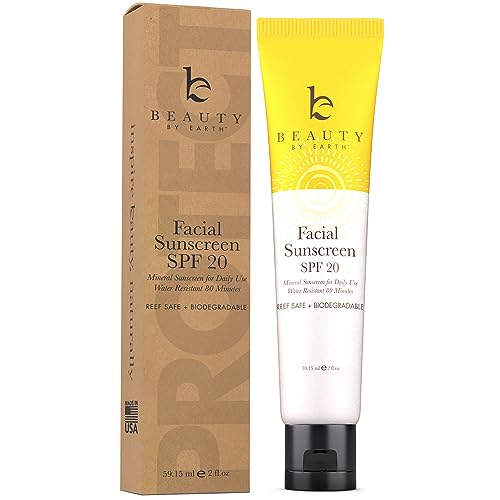
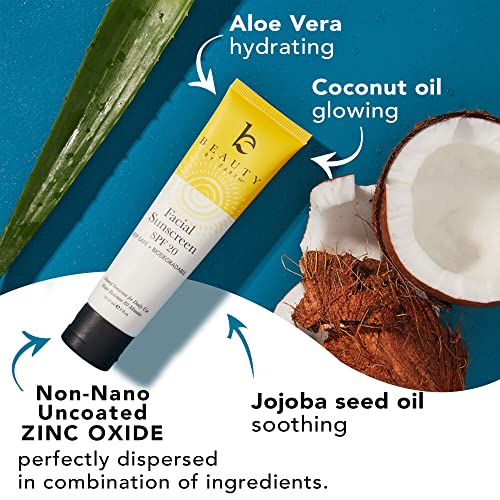
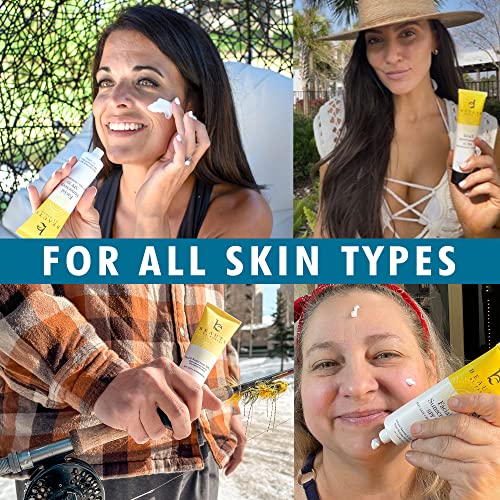
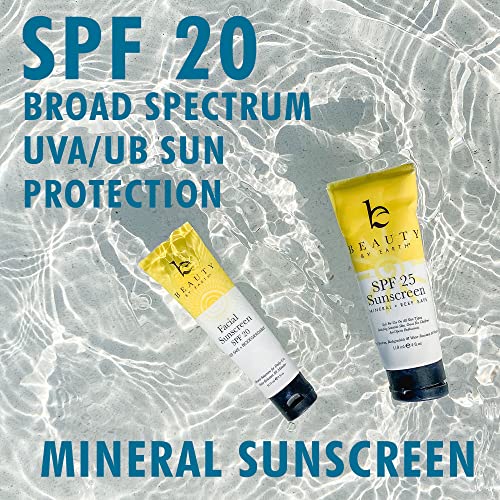
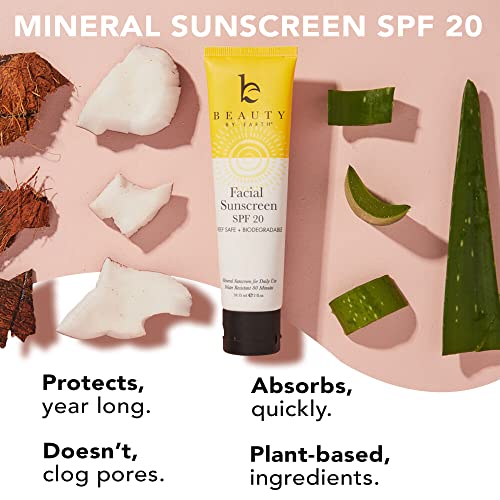
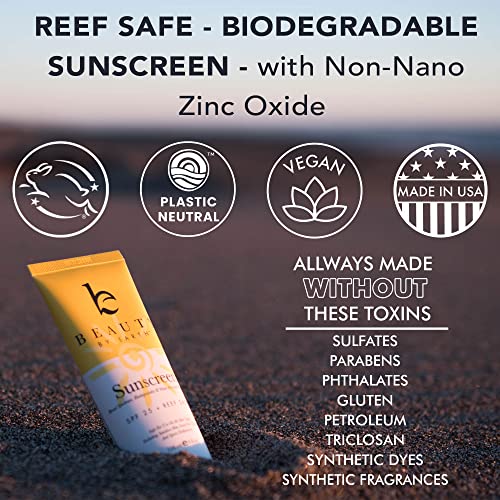
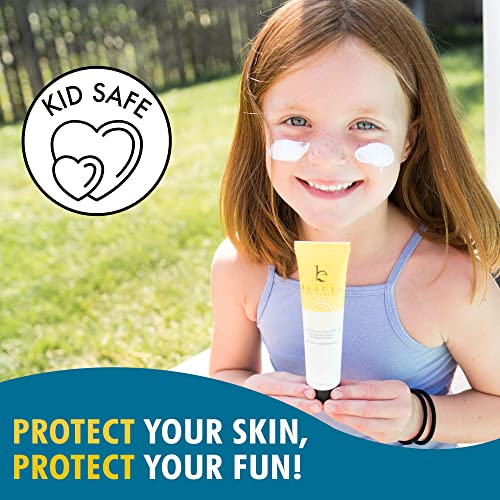
Mineral Face Sunscreen SPF 20 - Natural Ingredients, Non-Chalky, Biodegradable - Travel Size


Citrus Paradisi (Grapefruit) Oil
Medium RiskCitrus paradisi (grapefruit) oil is an essential oil derived from the peel of grapefruit. It is commonly used in personal care products for its fragrance and potential antibacterial properties. It is also utilized in aromatherapy and cosmetic formulations for its refreshing scent.
Sustai Insights
Citrus paradisi oil offers functional benefits such as fragrance enhancement and potential antimicrobial properties. However, it presents a high allergenic potential, which may cause skin irritation or allergic reactions in sensitive individuals. Environmental concerns include its persistence and bioaccumulation. Regulatory advisories exist that restrict its use in certain products, leading to an overall moderate risk assessment. Safe usage practices should be followed to minimize health risks, and alternatives such as essential oils with lower allergenic profiles could be considered.
Rosmarinus Officinalis (Rosemary) Leaf Extract
Medium RiskRosemary leaf extract is produced from the leaves of the Rosmarinus officinalis plant. It is commonly used in cosmetic formulations for its potential antioxidant properties and fragrance. The extract may also contribute to the preservation of products due to its antimicrobial characteristics.
Sustai Insights
Rosemary leaf extract offers functional benefits such as antioxidant and antimicrobial properties, which can enhance product stability and shelf-life. It is generally considered low risk for carcinogenicity and reproductive toxicity, but it carries a moderate potential for allergic reactions. Environmentally, it poses low risk with no significant pollutant or bioaccumulation concerns. Regulatory bodies have not placed significant restrictions on its use, although some verified products cannot contain certain concentrations. Overall, the ingredient's risk level is medium, necessitating careful usage practices to mitigate allergic responses.
Ricinus Communis (Castor) Seed Oil
Medium RiskCastor oil is extracted from the seeds of Ricinus communis and is commonly used in cosmetic and personal care products for its moisturizing and emollient properties. It is known for its ability to enhance skin absorption and provide a protective barrier.
Sustai Insights
Castor oil offers functional benefits as a moisturizer and emollient, enhancing skin absorption and providing a barrier against moisture loss. It is sustainably sourced and biodegradable. However, potential health risks include low levels of irritation and moderate concerns regarding developmental and reproductive toxicity. Environmental risks are low, with no significant pollutant or bioaccumulation concerns reported. Regulatory status shows no current restrictions. Overall, the risk level is assessed as medium, with recommendations for safe usage practices, and potential alternatives include other plant-based oils.
Argania Spinosa (Argan) Kernel Oil
Low RiskArgania spinosa (argan) kernel oil is a fixed oil extracted from the kernels of the argan tree, native to Morocco. It is commonly used in cosmetic formulations for its moisturizing properties, serving as an emollient and skin conditioner.
Sustai Insights
Argania spinosa kernel oil offers functional benefits such as effective hydration and nourishment for the skin and hair. It is sustainably sourced and biodegradable, contributing positively to environmental considerations. Health risks are low, with minimal concerns regarding carcinogenicity, allergies, or reproductive toxicity. There are no current regulatory restrictions on its use. Overall, it poses low risk, making it a suitable ingredient in cosmetic products. Safe usage practices should be maintained, and alternatives like jojoba oil may also be considered for similar benefits.
Aloe Barbadensis (Aloe Vera) Leaf Extract
Low RiskAloe vera leaf extract is produced from the succulent leaves of the Aloe barbadensis plant. It is commonly used in cosmetic formulations for its moisturizing and soothing properties, making it a popular ingredient in skincare and personal care products.
Sustai Insights
Aloe vera leaf extract offers several functional benefits, including hydration and skin soothing effects, which are well-supported by scientific literature. It is considered to have a low risk for common health concerns such as carcinogenicity, allergies, or reproductive toxicity. Environmentally, it poses minimal risks, with no significant pollutant potential or bioaccumulation reported. Regulatory bodies have not imposed major restrictions, although verified products should not contain certain contaminants. Overall, this ingredient is assessed as low risk, with safe usage practices and the availability of alternative soothing agents if desired.
Ascorbyl Glucoside
Low RiskAscorbyl glucoside is a product obtained by the reaction of ascorbic acid with glucose. It acts primarily as a stable form of vitamin C, commonly used in cosmetic formulations for its antioxidant properties and ability to brighten the skin.
Sustai Insights
Ascorbyl glucoside offers functional benefits such as antioxidant effects and skin brightening properties. It is considered safe with low health risks, including minimal concerns regarding carcinogenicity, allergies, or developmental toxicity. Environmental risks are also low, as it does not significantly contribute to pollution or bioaccumulation. Regulatory bodies impose no major restrictions, indicating overall low risk. Safe usage practices include adherence to cosmetic formulation guidelines, and potential alternatives could include other stable vitamin C derivatives. Thus, the overall assessment reflects a low risk profile.
Cocos Nucifera (Coconut) Oil
Low RiskCocos Nucifera (Coconut) Oil is derived from the kernels of the coconut palm. It is primarily used in cosmetic formulations for its emollient and moisturizing properties, making it suitable for skin and hair care products.
Sustai Insights
Coconut oil serves as an effective moisturizer and emollient, promoting skin hydration and softness. It is sustainably sourced and biodegradable. Health risks are minimal, with low concerns regarding carcinogenicity, allergens, and reproductive toxicity. Environmental impact is also low, as it does not contribute significantly to pollution or bioaccumulation. Regulatory bodies have not issued restrictions on its use. Overall, coconut oil presents a low risk for health and environmental concerns, making it a safe ingredient in cosmetic products.
Sorbitan Sesquistearate
Low RiskSorbitan sesquistearate is a mixture of mono and diesters of sorbitol and stearic acid. It primarily functions as an emulsifier in cosmetic formulations, helping to stabilize oil-in-water blends and improve texture.
Sustai Insights
Sorbitan sesquistearate offers functional benefits as an emulsifier, enhancing product stability and texture. It is considered low risk in terms of health concerns, with minimal allergenic potential and no known carcinogenic, developmental, or reproductive toxicity. Environmentally, it is not classified as a pollutant or bioaccumulative. Regulatory assessments affirm its safety for use. Recommendations include adhering to usage guidelines to maintain safety, while alternatives like glyceryl stearate may be considered for those seeking different emulsification options. Overall, the ingredient is assessed as low risk.
Xanthan Gum
Low RiskXanthan gum is a polysaccharide, a sugar-based compound produced by the fermentation of glucose or sucrose. It is commonly used as a thickening agent and stabilizer in various food and cosmetic products due to its ability to improve texture and prevent ingredient separation.
Sustai Insights
Xanthan gum serves effectively as a thickener and stabilizer, enhancing product texture and consistency. It is biodegradable and typically derived from renewable sources, supporting sustainability efforts. Health risks are minimal, with low concerns regarding carcinogenicity, allergies, and reproductive toxicity. Environmental impact is similarly low, posing no significant hazards. Regulatory agencies, including the FDA, regard it as safe for use, with no significant restrictions. Overall, xanthan gum is assessed as low risk, making it a suitable ingredient in formulations.
Helianthus Annuus (Sunflower) Seed
Low RiskHelianthus annuus (sunflower) seed is derived from the seeds of the sunflower plant and is commonly used in various cosmetic and personal care products. It serves primarily as an emollient and skin conditioning agent, providing moisture and enhancing the texture of formulations.
Sustai Insights
Helianthus annuus (sunflower) seed offers functional benefits, including skin conditioning and moisturizing properties, while being sustainably sourced and biodegradable. Health risks are minimal, with low concerns for carcinogenicity, allergies, and reproductive toxicity. Environmentally, it presents low risks of pollution or bioaccumulation. Regulatory assessments indicate no current restrictions. Overall, it is considered a low-risk ingredient, and safe usage practices should be maintained. Alternative ingredients may include other plant-based oils, but the sunflower seed oil remains a viable option.
Magnesium Sulfate
Low RiskMagnesium sulfate (Epsom salt) is an inorganic compound commonly used in various products for its properties as a drying agent, electrolyte, and muscle relaxant. It is often included in bath salts and personal care formulations to provide soothing effects.
Sustai Insights
Magnesium sulfate is effective as a muscle relaxant and is considered biodegradable, making it a sustainable choice. Health risks are minimal, with low concerns for carcinogenicity, allergenic potential, or reproductive toxicity. Environmental risks are also low, as it does not contribute significantly to pollution or bioaccumulation. Regulatory bodies have not issued significant warnings. Overall, the ingredient is assessed as low risk, with safe usage practices recommended, and it has few documented alternatives.
Glyceryl Stearate Se
Low RiskGlyceryl stearate SE is a self-emulsifying ingredient commonly used in cosmetic formulations to stabilize and thicken products. It acts as an emulsifier, helping to blend oil and water components effectively, which enhances the product's texture and stability.
Sustai Insights
Glyceryl stearate SE offers functional benefits as an emulsifier, promoting stability in formulations. It is considered low risk for health concerns, including cancer, allergies, and reproductive toxicity, with no significant environmental hazards reported. Regulatory bodies have not imposed restrictions on its use. Safe usage practices suggest following recommended concentrations in products. Overall, this ingredient is assessed as low risk, with no immediate alternatives needed.
Simmondsia Chinensis (Jojoba)
Low RiskSimmondsia chinensis, commonly known as jojoba, is an oil derived from the seeds of the jojoba plant. It is commonly used in cosmetic formulations for its moisturizing properties, acting as an emollient and skin conditioning agent.
Sustai Insights
Jojoba oil offers functional benefits such as effective skin moisturization and is biodegradable, with sustainable sourcing practices. Health risks are low, with minimal concerns regarding carcinogenicity, allergies, and reproductive toxicity. Environmental impact is negligible, with no pollutant or bioaccumulation potential. Regulatory status is favorable with no significant restrictions noted. Overall, it is assessed as low risk, and safe usage practices should be maintained. Alternatives include other plant-derived oils like argan or almond oil, which may provide similar benefits.
Argania Spinosa (Argan) Kernel Oil
Low RiskArgania spinosa (argan) kernel oil is a fixed oil extracted from the kernels of the argan tree, native to Morocco. It is commonly used in cosmetic formulations for its moisturizing properties, serving as an emollient and skin conditioner.
Sustai Insights
Argania spinosa kernel oil offers functional benefits such as effective hydration and nourishment for the skin and hair. It is sustainably sourced and biodegradable, contributing positively to environmental considerations. Health risks are low, with minimal concerns regarding carcinogenicity, allergies, or reproductive toxicity. There are no current regulatory restrictions on its use. Overall, it poses low risk, making it a suitable ingredient in cosmetic products. Safe usage practices should be maintained, and alternatives like jojoba oil may also be considered for similar benefits.
Aloe Barbadensis (Aloe Vera) Leaf Extract
Low RiskAloe vera leaf extract is produced from the succulent leaves of the Aloe barbadensis plant. It is commonly used in cosmetic formulations for its moisturizing and soothing properties, making it a popular ingredient in skincare and personal care products.
Sustai Insights
Aloe vera leaf extract offers several functional benefits, including hydration and skin soothing effects, which are well-supported by scientific literature. It is considered to have a low risk for common health concerns such as carcinogenicity, allergies, or reproductive toxicity. Environmentally, it poses minimal risks, with no significant pollutant potential or bioaccumulation reported. Regulatory bodies have not imposed major restrictions, although verified products should not contain certain contaminants. Overall, this ingredient is assessed as low risk, with safe usage practices and the availability of alternative soothing agents if desired.
Citrus Paradisi (Grapefruit) Oil
Medium RiskCitrus paradisi (grapefruit) oil is an essential oil derived from the peel of grapefruit. It is commonly used in personal care products for its fragrance and potential antibacterial properties. It is also utilized in aromatherapy and cosmetic formulations for its refreshing scent.
Sustai Insights
Citrus paradisi oil offers functional benefits such as fragrance enhancement and potential antimicrobial properties. However, it presents a high allergenic potential, which may cause skin irritation or allergic reactions in sensitive individuals. Environmental concerns include its persistence and bioaccumulation. Regulatory advisories exist that restrict its use in certain products, leading to an overall moderate risk assessment. Safe usage practices should be followed to minimize health risks, and alternatives such as essential oils with lower allergenic profiles could be considered.
Ascorbyl Glucoside
Low RiskAscorbyl glucoside is a product obtained by the reaction of ascorbic acid with glucose. It acts primarily as a stable form of vitamin C, commonly used in cosmetic formulations for its antioxidant properties and ability to brighten the skin.
Sustai Insights
Ascorbyl glucoside offers functional benefits such as antioxidant effects and skin brightening properties. It is considered safe with low health risks, including minimal concerns regarding carcinogenicity, allergies, or developmental toxicity. Environmental risks are also low, as it does not significantly contribute to pollution or bioaccumulation. Regulatory bodies impose no major restrictions, indicating overall low risk. Safe usage practices include adherence to cosmetic formulation guidelines, and potential alternatives could include other stable vitamin C derivatives. Thus, the overall assessment reflects a low risk profile.
Rosmarinus Officinalis (Rosemary) Leaf Extract
Medium RiskRosemary leaf extract is produced from the leaves of the Rosmarinus officinalis plant. It is commonly used in cosmetic formulations for its potential antioxidant properties and fragrance. The extract may also contribute to the preservation of products due to its antimicrobial characteristics.
Sustai Insights
Rosemary leaf extract offers functional benefits such as antioxidant and antimicrobial properties, which can enhance product stability and shelf-life. It is generally considered low risk for carcinogenicity and reproductive toxicity, but it carries a moderate potential for allergic reactions. Environmentally, it poses low risk with no significant pollutant or bioaccumulation concerns. Regulatory bodies have not placed significant restrictions on its use, although some verified products cannot contain certain concentrations. Overall, the ingredient's risk level is medium, necessitating careful usage practices to mitigate allergic responses.
Cocos Nucifera (Coconut) Oil
Low RiskCocos Nucifera (Coconut) Oil is derived from the kernels of the coconut palm. It is primarily used in cosmetic formulations for its emollient and moisturizing properties, making it suitable for skin and hair care products.
Sustai Insights
Coconut oil serves as an effective moisturizer and emollient, promoting skin hydration and softness. It is sustainably sourced and biodegradable. Health risks are minimal, with low concerns regarding carcinogenicity, allergens, and reproductive toxicity. Environmental impact is also low, as it does not contribute significantly to pollution or bioaccumulation. Regulatory bodies have not issued restrictions on its use. Overall, coconut oil presents a low risk for health and environmental concerns, making it a safe ingredient in cosmetic products.
Sorbitan Sesquistearate
Low RiskSorbitan sesquistearate is a mixture of mono and diesters of sorbitol and stearic acid. It primarily functions as an emulsifier in cosmetic formulations, helping to stabilize oil-in-water blends and improve texture.
Sustai Insights
Sorbitan sesquistearate offers functional benefits as an emulsifier, enhancing product stability and texture. It is considered low risk in terms of health concerns, with minimal allergenic potential and no known carcinogenic, developmental, or reproductive toxicity. Environmentally, it is not classified as a pollutant or bioaccumulative. Regulatory assessments affirm its safety for use. Recommendations include adhering to usage guidelines to maintain safety, while alternatives like glyceryl stearate may be considered for those seeking different emulsification options. Overall, the ingredient is assessed as low risk.
Xanthan Gum
Low RiskXanthan gum is a polysaccharide, a sugar-based compound produced by the fermentation of glucose or sucrose. It is commonly used as a thickening agent and stabilizer in various food and cosmetic products due to its ability to improve texture and prevent ingredient separation.
Sustai Insights
Xanthan gum serves effectively as a thickener and stabilizer, enhancing product texture and consistency. It is biodegradable and typically derived from renewable sources, supporting sustainability efforts. Health risks are minimal, with low concerns regarding carcinogenicity, allergies, and reproductive toxicity. Environmental impact is similarly low, posing no significant hazards. Regulatory agencies, including the FDA, regard it as safe for use, with no significant restrictions. Overall, xanthan gum is assessed as low risk, making it a suitable ingredient in formulations.
Ricinus Communis (Castor) Seed Oil
Medium RiskCastor oil is extracted from the seeds of Ricinus communis and is commonly used in cosmetic and personal care products for its moisturizing and emollient properties. It is known for its ability to enhance skin absorption and provide a protective barrier.
Sustai Insights
Castor oil offers functional benefits as a moisturizer and emollient, enhancing skin absorption and providing a barrier against moisture loss. It is sustainably sourced and biodegradable. However, potential health risks include low levels of irritation and moderate concerns regarding developmental and reproductive toxicity. Environmental risks are low, with no significant pollutant or bioaccumulation concerns reported. Regulatory status shows no current restrictions. Overall, the risk level is assessed as medium, with recommendations for safe usage practices, and potential alternatives include other plant-based oils.
Helianthus Annuus (Sunflower) Seed
Low RiskHelianthus annuus (sunflower) seed is derived from the seeds of the sunflower plant and is commonly used in various cosmetic and personal care products. It serves primarily as an emollient and skin conditioning agent, providing moisture and enhancing the texture of formulations.
Sustai Insights
Helianthus annuus (sunflower) seed offers functional benefits, including skin conditioning and moisturizing properties, while being sustainably sourced and biodegradable. Health risks are minimal, with low concerns for carcinogenicity, allergies, and reproductive toxicity. Environmentally, it presents low risks of pollution or bioaccumulation. Regulatory assessments indicate no current restrictions. Overall, it is considered a low-risk ingredient, and safe usage practices should be maintained. Alternative ingredients may include other plant-based oils, but the sunflower seed oil remains a viable option.
Magnesium Sulfate
Low RiskMagnesium sulfate (Epsom salt) is an inorganic compound commonly used in various products for its properties as a drying agent, electrolyte, and muscle relaxant. It is often included in bath salts and personal care formulations to provide soothing effects.
Sustai Insights
Magnesium sulfate is effective as a muscle relaxant and is considered biodegradable, making it a sustainable choice. Health risks are minimal, with low concerns for carcinogenicity, allergenic potential, or reproductive toxicity. Environmental risks are also low, as it does not contribute significantly to pollution or bioaccumulation. Regulatory bodies have not issued significant warnings. Overall, the ingredient is assessed as low risk, with safe usage practices recommended, and it has few documented alternatives.
Glyceryl Stearate Se
Low RiskGlyceryl stearate SE is a self-emulsifying ingredient commonly used in cosmetic formulations to stabilize and thicken products. It acts as an emulsifier, helping to blend oil and water components effectively, which enhances the product's texture and stability.
Sustai Insights
Glyceryl stearate SE offers functional benefits as an emulsifier, promoting stability in formulations. It is considered low risk for health concerns, including cancer, allergies, and reproductive toxicity, with no significant environmental hazards reported. Regulatory bodies have not imposed restrictions on its use. Safe usage practices suggest following recommended concentrations in products. Overall, this ingredient is assessed as low risk, with no immediate alternatives needed.
Simmondsia Chinensis (Jojoba)
Low RiskSimmondsia chinensis, commonly known as jojoba, is an oil derived from the seeds of the jojoba plant. It is commonly used in cosmetic formulations for its moisturizing properties, acting as an emollient and skin conditioning agent.
Sustai Insights
Jojoba oil offers functional benefits such as effective skin moisturization and is biodegradable, with sustainable sourcing practices. Health risks are low, with minimal concerns regarding carcinogenicity, allergies, and reproductive toxicity. Environmental impact is negligible, with no pollutant or bioaccumulation potential. Regulatory status is favorable with no significant restrictions noted. Overall, it is assessed as low risk, and safe usage practices should be maintained. Alternatives include other plant-derived oils like argan or almond oil, which may provide similar benefits.
Protect your skin daily with our Face Sunscreen SPF 20, a mineral sunscreen crafted with natural and organic ingredients for effective, reef-friendly sun protection. This biodegradable formula shields your skin without clogging pores or leaving a chalky residue.
- Effective Sun Protection: Formulated with non-nano zinc oxide, this sunscreen provides reliable SPF 20 defense against harmful UV rays, minimizing the risk of premature aging and skin damage.
- Gentle on Skin: Ideal for all skin types, the blend of organic aloe, coconut oil, and vitamin C nourishes and hydrates while preventing sunburn and rashes.
- Lightweight & Absorbent: Enjoy a non-greasy feel as this sunscreen absorbs quickly, allowing easy application under makeup for seamless daily use.
- Eco-Conscious Choice: With biodegradable ingredients and a reef-friendly formula, this sunscreen aligns with your commitment to sustainability and environmental protection.
- Customer Satisfaction Guaranteed: Backed by an unconditional satisfaction guarantee, this product ensures peace of mind with every purchase, reflecting our confidence in quality and effectiveness.
Subscribe & Save with Sustai
- Best Price Guarantee: Always enjoy the lowest prices on sustainable home essentials.
- No Surprises: We’ll notify you before shipping. No hidden fees, ever.
- You’re in Charge: Change, pause, or cancel your subscription anytime with ease.
- Eco-Friendly Deliveries: Our grouped shipments mean less packaging and lower emissions.
Join us on a sustainable journey. Special offers for a limited time! Prices and promotions may change.
Recommended Products
Protect your skin daily with our Face Sunscreen SPF 20, a mineral sunscreen crafted with natural and organic ingredients for effective, reef-friendly sun protection. This biodegradable formula shields your skin without clogging pores or leaving a chalky residue.
- Effective Sun Protection: Formulated with non-nano zinc oxide, this sunscreen provides reliable SPF 20 defense against harmful UV rays, minimizing the risk of premature aging and skin damage.
- Gentle on Skin: Ideal for all skin types, the blend of organic aloe, coconut oil, and vitamin C nourishes and hydrates while preventing sunburn and rashes.
- Lightweight & Absorbent: Enjoy a non-greasy feel as this sunscreen absorbs quickly, allowing easy application under makeup for seamless daily use.
- Eco-Conscious Choice: With biodegradable ingredients and a reef-friendly formula, this sunscreen aligns with your commitment to sustainability and environmental protection.
- Customer Satisfaction Guaranteed: Backed by an unconditional satisfaction guarantee, this product ensures peace of mind with every purchase, reflecting our confidence in quality and effectiveness.

You can have at most 2 Sustainable Steals products in your cart
Customer Reviews
Customers’ View
Customers appreciate the effective sun protection and eco-friendly formulation of this sunscreen. Many users highlight its lightweight, non-greasy texture, which absorbs quickly and does not leave a chalky residue on the skin. One reviewer noted, 'It goes on cleanly, leaves no oily or white residue, and makes my skin feel wonderful.' Additionally, the use of natural, non-toxic ingredients is frequently praised, making it suitable for sensitive skin. Eco-conscious consumers also value the recyclable packaging and reef-friendly ingredients. Some have expressed concerns about irritation if the product comes in contact with the eyes, but overall, customers find this sunscreen aligns well with their health and environmental values, making it a regular part of their daily skincare routine.
AI-generated from the text of customer reviewsThis product has no reviews yet.




